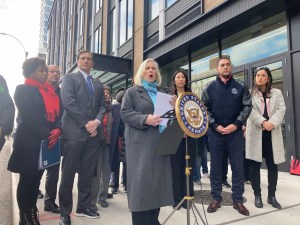Gillibrand Proposal Would Help Protect Transit From Climate Apocalypse

Rising waters need rising funds.
As New York considers the state of its efforts to shore itself up against storm surge and flooding that’s sure to come in the future, Sen. Kirsten Gillibrand (D-N.Y.) has introduced the Resilient Transit Act, which could help its leaky transit system plug some holes.

The Empire State’s junior senator’s bill would create an annual $300-million pool of money in the Federal Transit Administration’s State of Good Repair grants from 2023 to 2026 that specifically is set aside for transit agencies to pay for resiliency projects. Advocates say that the bill could prove useful as both a funding source for necessary projects and a precedent for more federal money in mass transit.
“Three hundred million dollars might not be enough on its own, but it’s a start,” said Regional Plan Association Vice President of Transportation Tiffany-Ann Taylor. “It’s dedicated funding, and it’s an opportunity to create a precedent and encouragement in general for funding for public transportation. It’s less than funding for highway and roadway projects, and this is another avenue where we can say, there’s a dedicated pot of money. But it would be great if it could be larger.”
The MTA is currently trying to shore up its transit system from future hurricanes and future flooding, the latter effort which involves coordination with other city agencies and taking care of its own house. The agency is installing raised landings at over three dozen ground-level subway stations, looking at ways to floodproof street vents on blocks around the city and is working with the city Department of Environmental Protection to figure out how to expand storm water capacity at six subway stations — all of which take money that Taylor says could come from this bill.
“The bill obviously covers other acts related to resiliency and climate change, but flooding is the thing that really comes to mind for me. I’m hopeful that there are projects in the hopper waiting to be funded, especially those that maybe are a little bit more creative in terms of protecting our infrastructure and that this money could go for,” she said.
The bill has a House sponsor in Rep. Adriano Espaillat (D-Washington Heights), but it could be buffeted by stormy weather in Congress with the Democrats looking at the prospect of losing control of the House (and maybe the Senate). But Taylor said the bill could still pick up support since it’s not a wild-eyed radical new way of giving out federal money.
“It’s part of a program that people are more familiar with because it would be formulaic funding, so the likelihood of it passing is probably stronger than other initiatives that have been introduced,” she said.

